A blog formerly known as Bookishness / By Charles Matthews
"Dazzled by so many and such marvelous inventions, the people of Macondo ... became indignant over the living images that the prosperous merchant Bruno Crespi projected in the theater with the lion-head ticket windows, for a character who had died and was buried in one film and for whose misfortune tears had been shed would reappear alive and transformed into an Arab in the next one. The audience, who had paid two cents apiece to share the difficulties of the actors, would not tolerate that outlandish fraud and they broke up the seats. The mayor, at the urging of Bruno Crespi, explained in a proclamation that the cinema was a machine of illusions that did not merit the emotional outbursts of the audience. With that discouraging explanation many ... decided not to return to the movies, considering that they already had too many troubles of their own to weep over the acted-out misfortunes of imaginary beings."--Gabriel García Márquez, One Hundred Years of Solitude
Search This Blog
Showing posts with label Johnny Depp. Show all posts
Showing posts with label Johnny Depp. Show all posts
Saturday, February 8, 2020
Rango (Gore Verbinski, 2011)
Cast: voices of Johnny Depp, Isla Fisher, Abigail Breslin, Ned Beatty, Alfred Molina, Bill Nighy, Stephen Root, Harry Dean Stanton, Timothy Olyphant, Ray Winstone. Screenplay: John Logan, Gore Verbinski, James Ward Byrkit. Cinematography: Roger Deakins. Production design: Mark "Crash" McCreery. Film editing: Craig Wood. Music: Hans Zimmer.
Rango's Oscar win for best animated feature is anomalous: The award typically goes to a product of the Disney/Pixar factory. And unlike the usual winners, the characters aren't the usual cuddly figures destined for the toy shelves, but a gnarly selection of lizards and rodents and other desert creatures, centered on Rango himself, a bulbous-eyed chameleon voiced brilliantly by Johnny Depp. Visually, then, Rango is aimed more at adult audiences than at the kiddies. On the other hand, its story is the usual excuse for harmless mayhem that is the stuff of most animated features. There is a good deal of wit in the film, much of it aimed at Western-movie clichés, but I found that on the whole it left me a little cold. There's something to be said for cuddliness after all.
Friday, September 27, 2019
Fear and Loathing in Las Vegas (Terry Gilliam, 1998)
Fear and Loathing in Las Vegas (Terry Gilliam, 1998)
Cast: Johnny Depp, Benicio Del Toro, Tobey Maguire, Katherine Helmond, Craig Bierko, Mark Harmon, Laraine Newman, Verne Troyer, Penn Jillette, Cameron Diaz, Lyle Lovett, Flea, Gregory Itzin, Gary Busey, Christopher Meloni, Christina Ricci, Michael Jeter, Harry Dean Stanton, Ellen Barkin. Screenplay: Terry Gilliam, Tony Grisoni, Todd Davies, Alex Cox, based on a book by Hunter S. Thompson. Cinematography: Nicola Pecorini. Production design: Alex McDowell. Film editing: Lesley Walker. Music: Ray Cooper.
Terry Gilliam's Fear and Loathing in Las Vegas invites the easy critical brush-off: What happened in Vegas should have stayed in Vegas. Many of its first-release critics, including Roger Ebert, certainly took that view. So did ticket-buyers, who stayed away. And even in hindsight it's a little hard to figure why the film was made when it was made. Hunter S. Thompson's book was published in 1971, and although there had been some earlier efforts to turn it into a movie, it was hardly fresh subject matter in 1998. But the film has developed followers over the years since, and it's now possible to appreciate the skill with which Gilliam takes on this recreation of a drug-maddened milieu, and especially the acting of Johnny Depp and Benicio Del Toro as the wildly tripping Duke and Dr. Gonzo. I will admit that Depp, 35 at the time, seems to me a little too young and fresh-faced for the dissipated Duke -- even though Thompson himself was pretty much the same age when the events he wrote about took place -- but it's one of his best performances. The film also benefits from an abundance of familiar faces in small roles, such as the underappreciated Ellen Barkin as a waitress unwilling to put up with abusive stoners. Fear and Loathing in Las Vegas probably has little value except as a portrait of the Nixon era as seen from the end of the Clinton era, and it's certainly an exhausting film to watch, but it's a unique experience.
Saturday, March 16, 2019
Murder on the Orient Express (Kenneth Branagh, 2017)
Murder on the Orient Express (Kenneth Branagh, 2017)
Cast: Kenneth Branagh, Daisy Ridley, Leslie Odom Jr., Tom Bateman, Penélope Cruz, Josh Gad, Johnny Depp, Derek Jacobi, Michelle Pfeiffer, Judi Dench, Olivia Colman, Willem Dafoe. Screenplay: Michael Green, based on a novel by Agatha Christie. Cinematography: Haris Zambarloukos. Production design: Jim Clay. Film editing: Mick Audsley. Music: Patrick Doyle.
Monday, July 3, 2017
Dead Man (Jim Jarmusch, 1995)
 |
| Johnny Depp in Dead Man |
Nobody: Gary Farmer
Cole Wilson: Lance Henriksen
Conway Twill: Michael Wincott
Johnny "The Kid" Pickett: Eugene Byrd
John Scholfield: John Hurt
John Dickinson: Robert Mitchum
Salvatore "Sally" Jenko: Iggy Pop
Benmont Tench: Jared Harris
Big George Drakoulios: Billy Bob Thornton
Thel Russell: Mili Avital
Charlie Dickinson: Gabriel Byrne
Train Fireman: Crispin Glover
Trading Post Missionary: Alfred Molina
Director: Jim Jarmusch
Screenplay: Jim Jarmusch
Cinematography: Robby Müller
Production design: Bob Ziembicki
Music: Neil Young
It was probably inevitable that Jim Jarmusch and Johnny Depp, two of American film's best-known off-beat artists, would collaborate, and it seems appropriate that they should do it in that quintessentially off-beat American genre, the "stoner Western."* Unfortunately, for some viewers the film just feels stoned: slow, meandering, and fixated on images that refuse to yield up their significance. It is, I think, one of those films that are more involving to think about after watching them, which is why its reputation has grown since its initial release, when Roger Ebert, among other critics, dismissed it as "unrewarding." It opens with a long montage of young accountant William Blake's westward train journey from Cleveland to the end-of-the-line factory town called Machine, a name that suggests the real manifest destiny of the United States was the spread of industrial capitalism. Blake is on his way to a job with the Dickinson Metalworks in Machine, and is unaware that he shares a name with the poet and artist who was one of the great enemies of industrial capitalism. He dozes through spectacular scenery that has filled the great Westerns -- a reminder that before there were movies there were train windows. But when he arrives in Machine, no job is waiting for him, and his protests are futile when he demands to see Mr. Dickinson, who turns out to be the always-formidable Robert Mitchum in his last screen role. Moreover, that night he kills Dickinson's son in self-defense and, wounded himself, flees town on a stolen horse. Dickinson immediately hires a trio of gunmen to kill him. Blake is found half-dead from his wound by an Indian, who patches him up but also tells him that the bullet is lodged near his heart and he will die from it eventually. The Indian is called Nobody because he belongs to no tribe, having been abducted by white men as a child and taken to England to be exhibited. He was educated there and learned to love the art and poetry of William Blake, so naturally he proclaims the hapless accountant a reincarnation of the poet. And so Blake and Nobody begin an odyssey toward the Pacific, a picaresque in which Jarmusch manages to cross an adventure story with a satiric look at the failure of American ideals, using bits of Blake's prophetic verse as a running commentary. (Remarkably, quotations from Blake turn out to sound much like the kind of native wisdom usually ascribed to American Indians in the movies.) It's to Jarmusch's credit that this high-concept blend becomes as moving as it often is, especially, as I've suggested, in retrospect.
*Jarmusch referred to Dead Man as a "psychedelic Western," but aside from the scene in which Nobody, under the influence of peyote, sees the skull beneath William Blake's skin, it doesn't have the conventional distortions and hallucinations associated with movie psychedelia.
Watched on The Movie Channel
Wednesday, August 24, 2016
Black Mass (Scott Cooper, 2015)
Having long ago effaced the stigma of being a teen heartthrob on the TV series 21 Jump Street (1987-90), and having earned three Oscar nominations, Johnny Depp no longer has to prove himself as an actor. But his recent career has been marked by disastrous flops -- Alice Through the Looking Glass (James Bobin, 2016), Mortdecai (David Koepp, 2015), The Lone Ranger (Gore Verbinski, 2013) -- and too much reliance on the Pirates of the Caribbean series. Black Mass is a partial redemption for those failings, mostly because Depp becomes the best reason for seeing it. Apart from Depp's cruel and icy portrayal of Boston mobster James "Whitey" Bulger, there's not enough heft and momentum to Scott Cooper's film. It takes a fascinating story of the interrelationships between Bulger's mob, the FBI, and the government of the Commonwealth of Massachusetts and reduces it to a routine and often derivative gangster movie. Cooper and screenwriters Mark Mallouk and Jez Butterworth borrow shamelessly from GoodFellas (Martin Scorsese, 1990) in a scene in which Bulger playfully terrorizes a colleague in the same way Joe Pesci's character -- "What do you mean, I'm funny?" -- frightens Ray Liotta's Henry Hill. The film often seems overloaded with good actors -- Joel Edgerton, Benedict Cumberbatch, Kevin Bacon, Peter Sarsgaard, Jesse Plemons, Adam Scott, Julianne Nicholson -- in parts that don't give them enough to do. And while it was filmed in Boston, it misses the opportunity to capture the Boston neighborhood milieu in which Whitey, his politician brother Billy (Cumberbatch), and FBI agent John Connolly (Edgerton) grew up, something that was done to much better effect in films like Mystic River (Clint Eastwood, 2003), Gone Baby Gone (Ben Affleck, 2007), and even Good Will Hunting (Gus Van Sant, 1997). Still, the cold menace projected by Depp's Bulger is haunting, enhanced by the decision to provide the actor with ice-blue contact lenses that pierce through the shadows and give him an air of otherworldly surveillance.
Saturday, September 26, 2015
Into the Woods (Rob Marshall, 2014)
 |
| James Corden and Emily Blunt in Into the Woods |
Baker/Narrator: James Corden
Baker's Wife: Emily Blunt
Witch: Meryl Streep
Wolf: Johnny Depp
Cinderella's Prince: Chris Pine
Jack: Daniel Huttlestone
Stepmother: Christine Baranski
Florinda: Tammy Blanchard
Lucinda: Lucy Punch
Jack's Mother: Tracey Ullman
Rapunzel's Prince: Billy Magnussen
Little Red Riding Hood: Lilla Crawford
Baker's Father: Simon Russell Beale
Cinderella's Mother: Joanna Riding
Rapunzel: Mackenzie Mauzy
Granny: Annette Crosbie
Steward: Richard Glover
Giant: Frances de la Tour
Director: Rob Marshall
Screenplay: James Lapine
Based on the play by James Lapine
Cinematography: Dion Beebe
Production design: Dennis Gassner
Film editing: Wyatt Smith
Music: Stephen Sondheim
My favorite movie musicals tend to be the ones like Singin' in the Rain (Stanley Donen and Gene Kelly, 1952) and Meet Me in St. Louis (Vincente Minnelli, 1944) that were created for the movies, and not the ones adapted from stage hits like My Fair Lady (George Cukor, 1964) or West Side Story (Jerome Robbins and Robert Wise, 1961). But Rob Marshall did such a good job transforming Chicago (2002) into a cinematic experience that I had hopes for Into the Woods. Unfortunately the James Lapine-Stephen Sondheim book and lyrics are so droll and cerebral that they tend to get swamped by the special effects and big stars in the movie. Instead of being caught up in the story, I kept wondering "how are they going to top that?" The book is structured to be anticlimactic, with the wedding of Cinderella and the prince as the usual happy ending followed by the dark not-so-happily-ever-after sequel. This works in the theatrical version, when you know that there's another act coming, but in the film version it has the effect of making you look at your watch. Still, there's a lot to like about the movie, especially seeing Meryl Streep ham it up as the witch. The other cast members are also effective, but the real star among them for me is Emily Blunt as the baker's wife, demonstrating good comic timing as well as a solid understanding of the character.
Subscribe to:
Comments (Atom)












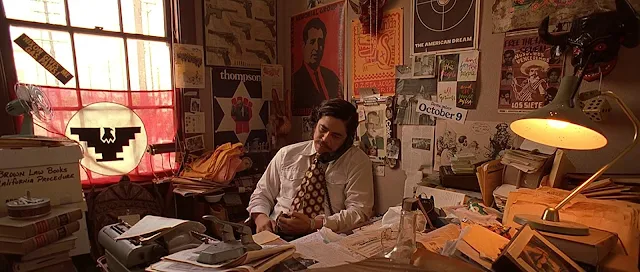


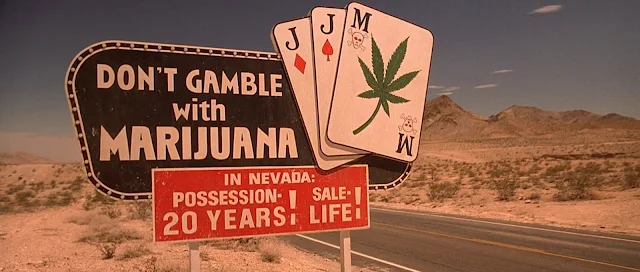




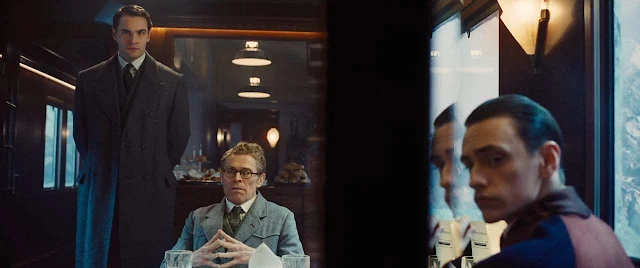

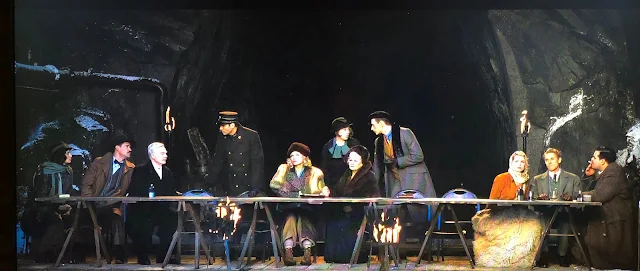

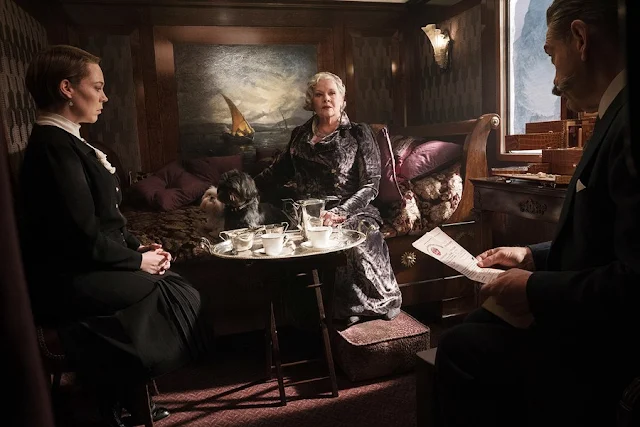



_poster.jpg)